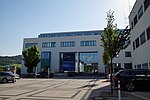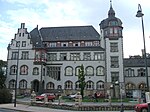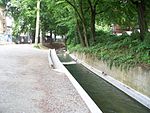Max Planck Institute for Chemical Ecology

The Max Planck Institute for Chemical Ecology is located on Beutenberg Campus in Jena, Germany. It was founded in March 1996 and is one of 80 institutes of the Max Planck Society (Max Planck Gesellschaft). Chemical ecology examines the role of chemical signals that mediate the interactions between plants, animals, and their environment, as well as the evolutionary and behavioral consequences of these interactions. The managing director of the institute is Jonathan Gershenzon. About 175 scientists, among them many PhD candidates and students, do their research in five departments and further independent research groups. Department of Molecular Ecology (acting director: Sarah O'Connor) Department of Biochemistry (Jonathan Gershenzon) Department of Evolutionary Neuroethology (Bill S. Hansson) Department of Insect Symbiosis (Martin Kaltenpoth) Department of Natural Product Biosynthesis (Sarah O'Connor) Emeritus Group Entomology (David G. Heckel) Max Planck Research Group Predators and Toxic Prey (Hannah Rowland) Max Planck Research Group Extreme Events (Huw S. Groucutt) Lise Meitner Group Social Behavior (Yuko Ulrich) Research Group Olfactory Coding (Silke Sachse) Research Group Plant Defense Physiology (Axel Mithöfer) NMR Group (Christian Paetz) Mass Spectrometry Group (Rayko Halitschke) Max Planck Fellow Group Plankton Community Interaction (Georg Pohnert)
Excerpt from the Wikipedia article Max Planck Institute for Chemical Ecology (License: CC BY-SA 3.0, Authors, Images).Max Planck Institute for Chemical Ecology
Hans-Knöll-Straße, Jena Süd (Jena-Süd)
Geographical coordinates (GPS) Address Nearby Places Show on map
Geographical coordinates (GPS)
| Latitude | Longitude |
|---|---|
| N 50.910555555556 ° | E 11.568055555556 ° |
Address
Max Planck Institut für Chem. Ökologie
Hans-Knöll-Straße
07745 Jena, Süd (Jena-Süd)
Thuringia, Germany
Open on Google Maps











